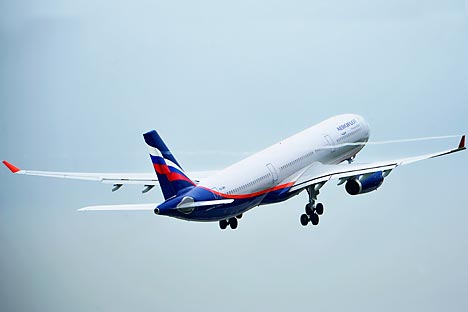
International airline companies, developing on the “national carrier” scenario, are characterized by “a global presence, turbo-growth and management of several brands.” These carriers create the “rules of the game,” and Aeroflot says these are Air France, Lufthansa, British Airways, and others. Source: ITAR-TASS
New timelines for the privatization of Aeroflot are described in the materials that the airline prepared for expert hearings on the “road map” of Aeroflot privatization. Withdrawal of the state from Aeroflot’s capital should be carried out in two stages.
In the first stage (2013–2015), it is necessary to complete the integration of the regional Rostech companies into the Aeroflot Group, create a low cost carrier, and so on. It will then be possible to reduce the government's stake in the airline from 51.17 to 50 percent plus 1 share, and to increase the number of publically traded shares to 40 percent, by placing an additional 10.55 percent of the shares (3.55 percent from Rostech, treasury shares of 4.66 percent, and an additional issue of 2.34 percent).
On the Moscow Stock Exchange, 10.55 percent of Aeroflot was worth 6.48 billion rubles ($203 million at current exchange rates) in late October. The state's interest dropping to 25 percent plus 1 share is proposed only for the second stage, in 2016–2020. The decision on the form and timing of the second stage should be made in 2015. According to the privatization plan forecast published by Federal Property Management Agency, the state's share in Aeroflot must be reduced to a blocking package by 2016.
A representative of Aeroflot assured that the “road map” has been approved by the Federal Property Management Agency. A representative of the agency, however, was not available for comment.
“There is a feeling that [the CEO of Aeroflot, Vitaly] Savelyev categorically does not want privatization at this time. It seemed to me that [the head of the Federal Property Agency, Olga] Dergunova supports him,” one of the participants at the hearings said, sharing his impressions. “Mr. Savelyev managed to negotiate with the Federal Property Management Agency and banks that were advising on the privatization issue, and his position has been accepted by all parties.”
Savelyev believes that the shares should be sold only when the company is at the peak of capitalization; currently, Aeroflot is undervalued by 30–50 percent, said a source close to Aeroflot. It would be wrong if the bonus from a further increase of capitalization was obtained by the buyer and not the state, as the current owner, the source told Vedomosti.
Aeroflot backs up its position with an analysis of international experience. International airline companies, developing on the “national carrier” scenario, are characterized by “a global presence, turbo-growth and management of several brands.” These carriers create the “rules of the game,” and Aeroflot says these are Air France, Lufthansa, British Airways, and others.
Carriers who “obey the rules of the game” develop as “regional airlines”—for example, Austrian, Swiss (both part of the Lufthansa Group), LOT, Malev, and others. These were quickly privatized and are now engaged only in “supplying global players with passengers.” They ended up playing this role because of the “destructive arrogance [of their governments] toward the liberalization of the market,” “support of internal competition,” and “poor attention to the full development of hubs.”
“An overly liberal attitude toward the development of national aviation leads to the fact that a country is forced to take secondary positions in the global market with its inefficient national carrier,” the presentation at the hearing emphasized. If Aeroflot follows this path, “the risk of losing air transport self-reliance by Russia would sharply increase.”
The chief analyst of the Aviaport Agency, Oleg Panteleyev, agrees that Aeroflot is now undervalued by about 40 percent: “Regardless of the timing of the privatization of Aeroflot, the possible benefits from measures that the government may take to improve its capitalization [adjustment of the legislation toward a low-cost carrier, increased international presence] are enormous.”
Rosneft privatization gets green light
It is possible to achieve capitalization growth without major investments into the airline, notes Panteleyev. “It is a huge advantage for the Federal Property Management Agency not to invest a dime and be able to obtain capitalization growth of 40 percent,” the analyst says.
According to the director of UTair Airlines, Andrei Martirosov, Aeroflot has changed: “The company has a different business philosophy now, the state now does not create special conditions for it, and, if changing the rules of the game for Aeroflot [for example, by creating Aeroflot as a low-cost carrier], it changes rules for all the other airlines. However, if the state allows a bias toward support of Aeroflot to the detriment of the other airlines, investors will leave the industry, and this would be wrong. It would be better to nationalize all airlines then.”
First published in Russian in Vedomosti.
All rights reserved by Rossiyskaya Gazeta.
Subscribe
to our newsletter!
Get the week's best stories straight to your inbox